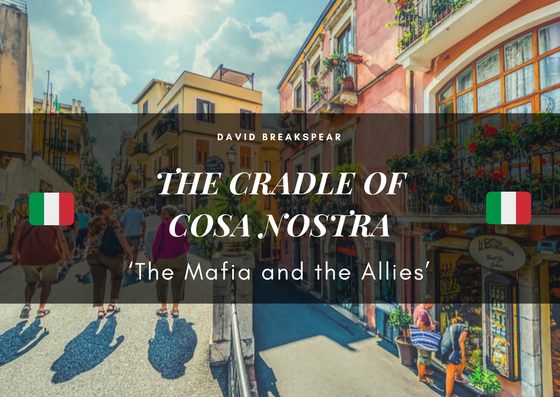The stage is Sicily. On stage are men of the state and Mafia bosses. It is a tragedy of death, intrigue and mystery, but also of struggle, passion and life. The stage is set as we continue our look at The Sicilian Mafia in a land of secrets, shadow and myth that gave birth to the Mafia.
As a child Giuseppe ‘Joe Bananas’ Bonnano grew up in Castellamare del Golfo, a town and commune in the Trapani Province of Sicily. The name can be translated as “Sea Fortress on the Gulf”. It was here that he fell in love with the story of the Sicilian Vespers. The Sicilian Vespers is the name of the rebellion, on the island, against the French born king, Charles I who had been ruler of Sicily since 1266. During Easter of 1282 as the people of Palermo were making their way to ‘Vespers’ (evening prayer), outside the churches tax collectors were waiting to arrest debtors. They would then be handcuffed and taken off to prison. A French soldier, by the name of Droetto, grabbed a pretty girl, who was walking with her mother, under the pretence of working for the tax collectors. He subsequently raped the girl behind the church, leaving her mother heart stricken running through the streets of Palermo crying loudly “Ma fia, ma fia!” which is Sicilian for ‘my daughter, my daughter’. The girls enraged fiancé went looking for, found and stabbed Droetto to death. Bonnano suggests that ‘Ma Fia’ became the resistances’ rallying cry. They stated it was an acronym for ‘Morte alla Francia, Italia anela’ (Death to France, Italy cries out).
There have been many links between conflicts and the Mafia, the landings in Sicily by the allied forces in World War Two being one of them.
Mafia Boss Calogero Vizzini (Don Calò) was rumoured to be in favour of the allied forces landing in Sicily during WW2. Rumours exist when it comes to the part that the Mafia played in the landings, however, they have rarely been confirmed. It was even said that the arrival of the allies in Italy was favoured by the boss of the Italian-American mafia Lucky Luciano but again rumours, Luciano returned to Italy only after the war ended, in 1946, when he was expelled from the United States after being released from prison early, in return for providing Mafia protection for New York’s docks. However, as the most powerful Mafia Boss in America, one would expect that he would be in contact with his Sicilian counterpart.
It is said that on the night of July 14th , 1943 a small plane flew low over Villalba, a small American army plane, dropping a black nylon bag containing a yellow silk handkerchief with a black initial ‘L’ on it. The bag was dropped near to the home of Don Calòs’ brother. It was found by a private and handed to the commander of the local carabinieri in Villalba. The next day the same thing happened again, this time with the words “Zu Calò” (Uncle Calò) on it, it was delivered to Calogero Vizzini. Don Calò untying the bag, found within, another yellow silk handkerchief with the black initial ‘L’. Upon receiving the silk handkerchief Don Calò knew that Lucky Luciano was asking for help. The American authorities were certainly aware of how influential Lucky was. Later that night a runner was dispatched carrying a letter to Giuseppe Genco Russo, regarded at that time as second to Don Calò in the Mafia hierarchy, it said:
“Turi, the farm bailiff, will go to the fair at Cerda with the calves, on Thursday the 20th. I will leave on the same day with the cows, ox-carts and the bull. Get faggots for making the cheese and provide folds for the sheep. Tell the other bailiffs to get ready. I’ll see to the rennet.”
Calves were the American motorised division; the cows – troops, Ox-carts – tanks and the bull – the American commander in chief. The letter indicated, Mafia boss Turi would leave on the 20th to accompany the calves – American motorised division – as far as Creda, Don Calò would accompany the main body of the army. Later that day three American tanks, one flying a yellow flag with a black initial ‘L’ on it, arrived in Villalba. Don Calò, appearing in shirtsleeves and braces, met the American officer who had climbed down from the tank. It is reported that, true to his reputation for preferring actions over words, Don Calò didn’t utter a word. The man that was widely known as the Capo dei Capi handed over the yellow silk handkerchief that had been dropped by plane.
Within days the war in Western Sicily was at an end, the British and Canadian forces were still trying to fight their way round Etna and it would take another three weeks for them to reach their goal of Messina. Although based on rumours and conjecture what is irrefutable is the fact that the Americans took Western Sicily with hardly any shots being fired in anger, if at all!
